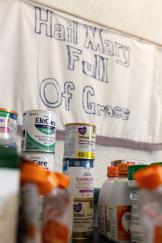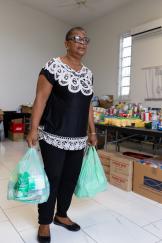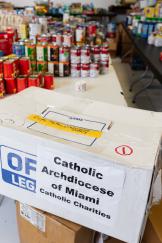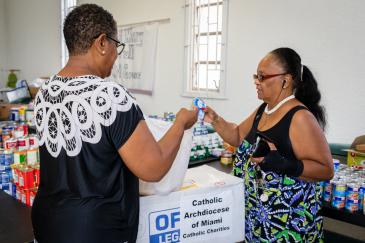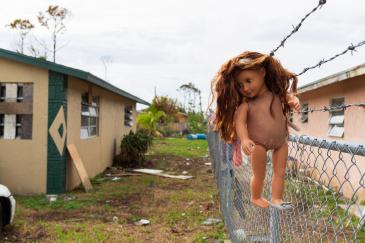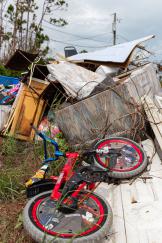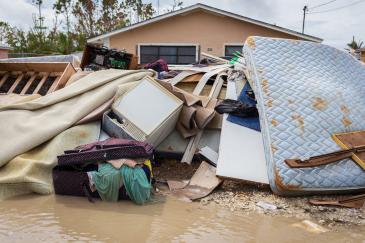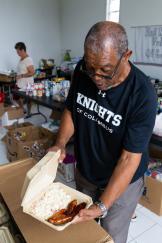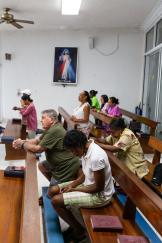By Tom Tracy - Florida Catholic
Photography: TOM TRACY | FC
FREEPORT, Grand Bahama | “After the storm” — a phrase undoubtedly used for generations in the “Hurricane Alley” of the warm-water Atlantic — carries added meaning following Hurricane Dorian’s historic landfall more than a month ago.
“We’ve been through a horrific hurricane and I don’t think we will ever forget this one. I have not experienced anything like this in my lifetime and I have been around for a little while,” said Patrick Ferguson, a retired national radio broadcaster in the Bahamas and a longtime member of Mary, Star of the Sea, the so-called mother parish on Grand Bahama.
After Abaco, this was the hardest hit region of the Bahamas following the Sept. 1-3 hurricane.
At the start of what was the first week with restored electrical power at “Mary, Star,” as it’s known by locals, Ferguson, along with a core staff and volunteer team, reflected on how Hurricane Dorian has transformed the parish and its St. Vincent de Paul outreach into a de facto emergency food and supplies outpost for the wider neighborhood.
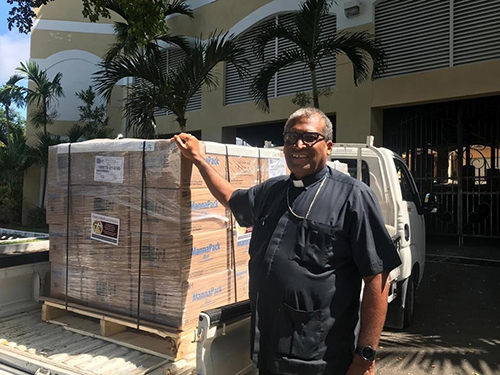
Photographer: COURTESY
Nassau Archbishop Patrick Pinder stands by the first of two shipments of relief supplies sent by Catholic Charities of the Archdiocese of Miami to aid those recovering from Hurricane Dorian in The Bahamas. Peter Routsis-Arroyo, CEO of Catholic Charities, said, "As of now, and until Archbishop Pinder tells us his needs have changed, everything we send is shipping between Nassau, where Archbishop Pinder is working closely with the local shelters on New Providence, and Mary, Star of the Sea in Freeport, which is a major relief site."
Donated provisions and supplies have been pouring in over the last few weeks, including the first of two shipments of donations made possible by the Archdiocese of Miami’s special collection for the Bahamas, now exceeding $200,000, according to Peter Routsis-Arroyo, CEO of Miami’s Catholic Charities.
But it has also been a time to think about the fragility of life and how Hurricane Dorian claimed homes, lives and livelihoods, impacting an estimated 75,000 and leaving some 600 still on the government’s official list of missing persons. Most of them are from Great Abaco but some are from Grand Bahama as well.
During the hurricane, Ferguson got a call from his daughter telling him that the flooding was coming down Coral Road into Freeport from the north of Grand Bahama. He gathered up his family, including his 93-year-old, wheelchair-bound mother-in-law, and moved them to a shelter.
“The roof on the backside of our house is gone, so we are trying to rebuild that now and have that covered with a tarp, and we like to get that settled because we have the Advent season coming up — and it will be a rough Christmas season this time around for many, many souls,” he said.
DORIAN’S LESSONS
“Dorian also teaches us some things: We need to be humble and stop loving things and start to love other people; and for all our parishioners and citizens to realize that man is not in control, God is in control,” said Ferguson.
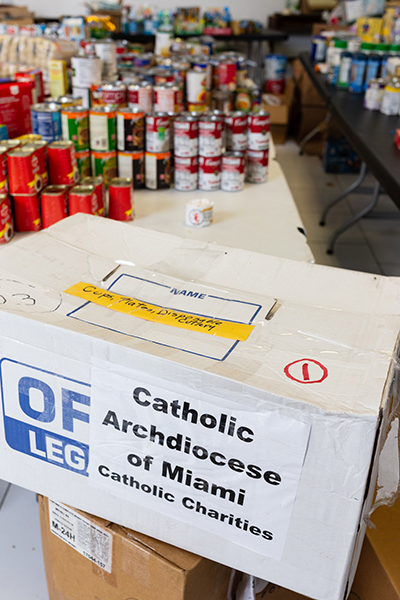
Photographer: TOM TRACY | FC
At Mary, Star of the Sea Parish in Freeport, Bahamas, donated provisions and supplies were made possible by the Archdiocese of Miami’s special collection for the Bahamas, now exceeding $ 200,000. A second delivery of goods was in the works.
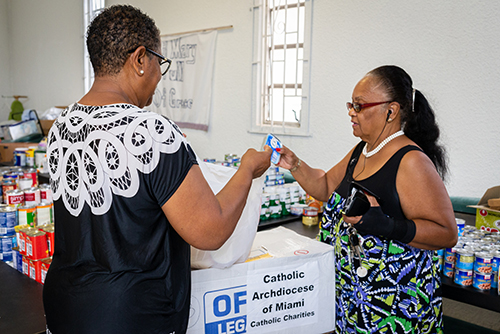
Photographer: TOM TRACY | FC
Shurn Sawyer, parish outreach director at Mary, Star of the Sea in Freeport, and a countrywide director for the St. Vincent de Paul Society in the Bahamas, creates care packages for distribution Oct. 8, more than a month following Hurricane Dorian's impact in The Bahamas.
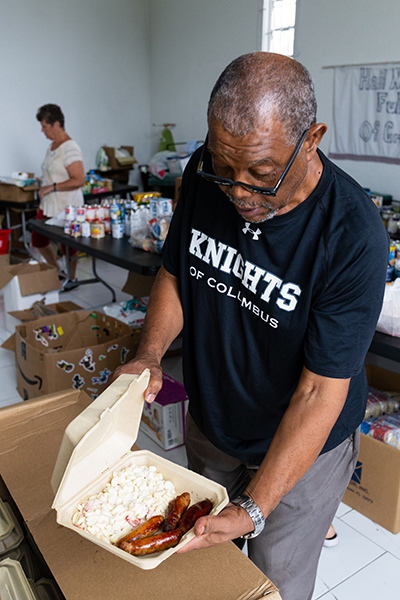
Photographer: TOM TRACY | FC
Patrick Ferguson, a retired national radio broadcaster in the Bahamas and a longtime member of Mary, Star of the Sea Parish in Freeport, prepares a hot meal for distribution Oct. 8, more than a month following Hurricane Dorian's impact in The Bahamas.
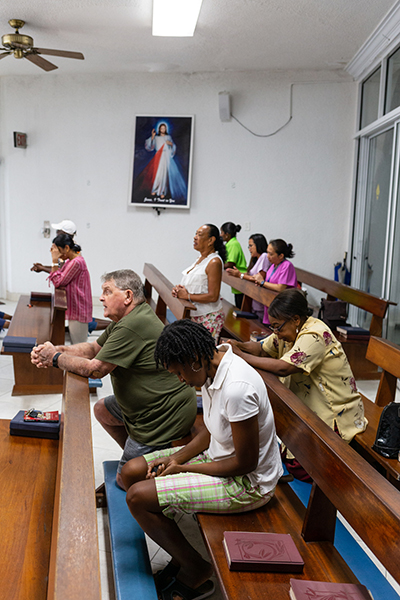
Photographer: TOM TRACY | FC
Parishioners gather for noon Mass at Mary, Star of the Sea Parish in Freeport Oct. 8, more than a month following Hurricane Dorian's impact in The Bahamas. The area was heavily damaged by Dorian's storm surge-flooding throughout Grand Bahama.
He serves as Boy Scout master for Grand Bahama and said that some of the Scouts went door to door during the storm to check on the elderly, rescuing many from the rising storm surge.
Out behind Mary, Star are several trailers which carried in the donations from South Florida. As soon as they arrived here, the staff and volunteers said they unpack the products and re-package the goods as care bags, and making it easier to go into hard-hit suburbs such as Hudson Estates, and to more remote communities — as well as to accommodate local families dropping in for canned goods, bottled water, sanitary items, baby supplies and even cleaning supplies.
Especially popular have been the hot daily meals making their way into the Grand Bahama community courtesy of World Central Kitchen, a nonprofit devoted to providing meals in the wake of natural disasters.
“As of now, and until (Nassau) Archbishop Patrick Pinder tells us his needs have changed, everything we send is shipping between Nassau, where Archbishop Pinder is working closely with the local shelters on New Providence, and Mary, Star of the Sea in Freeport, which is a major relief site,” said Routsis-Arroyo, adding that Miami Catholic Charities is accessing other possible projects in the wake of Dorian. And some individual parishes in Miami have been sending over their own relief shipments.
Residents coming to Mary, Star for the supplies are being met by a manager of the distribution there, Shurn Sawyer, parish outreach director at Mary, Star, and a countrywide director for the St. Vincent de Paul Society in the Bahamas.
Sawyer points toward where the flood water had risen several feet up the inside walls of the parish office but largely spared the main church structure. Next door at Mary, Star of the Sea Catholic Academy, contractors have already ripped out water damaged materials and begun replacing interior walls and damaged roofing.
Though not as devastated as the east of Grand Bahama, many in this part of the island have lost everything — homes, cars and personal belongings — to the flood waters, Sawyer said.
“And some of them are just walking around in a daze. We lost a lot of lives and even though I didn’t lose anyone in my family I feel it, and you hear a lot of stories,” she said, noting how it seemed to her that the church’s weekly and daily scriptures and readings leading up to Hurricane Dorian seemed to relate to the harsh fate in store for the Bahamas this year.
“We have Mass every morning and then we have what we call ‘church after church,’ where older members meet and talk about scriptures — and how amazing it seemed to fit in just before Dorian and how we are not supposed to lose hope,” she said.
To lift spirits at Mary, Star, the parish has retooled its annual bazaar and raffle Nov. 16 to serve as a post-hurricane family fun day where the wider community can gather.
MANY STILL MISSING
Some, especially those with school-aged children, have gone away temporarily to Nassau or various places in the United States, and are slowly starting to return. Others are enrolling children in schools elsewhere since the public schools in Grand Bahama have not announced a reopening date.
“And they are still looking for bodies; they found one last week and there are still a lot of people missing from the east end (of Grand Bahama),” Sawyer said. That includes a mother and daughter in the parish area of High Rock who are assumed to have been taken by the storm surge.
In the Freeport business community, many of the retailers are closed, including, crucially, several building materials and grocery stores along with a lot of mom-and-pop businesses that provided employment and materials for the local economy.
“We did an online survey of businesses the first week after the hurricane and we know that at least half are closed,” said Mercynth Ferguson, executive director of the Grand Bahama Chamber of Commerce in Freeport and also a member of Mary, Star.
Many of the local businesses lost heavy equipment and even members of the police force in Grand Bahama are reportedly driving rental cars now.
“We are trying to be a resource center for the business community,” Ferguson said. “People need equipment and loans to get them back in operational mode because the business zone really took a hit.”
There are some 400 businesses in Hurricane Dorian’s flood zone, she added, including home goods, dress shops, harbors, tailors, bakeries, pet supply stores. Larger employers like the oil industry, pharmaceutical and shipyard operations in Freeport have the resources to rebound more quickly.
“When your business is down you just don’t feel normal. People need to feel safe and that they have something to get up and go to but now you don’t have something to go to with normal day-to-day operations,” Ferguson added.
Another employer struggling to get back to normal is the Rand Memorial Hospital in Freeport, which was partially flooded. It is now operating outdoors under tents with the assistance of foreign NGOs and medical volunteers.
Meanwhile, in South Florida, parishes continue to collect resources for the Bahamas. Catholic Charities USA has provided some funds to assist Bahamas evacuees to the U.S, according to Routsis-Arroyo.
Many evacuees have come to Florida on cruise ships, ferry boats or flights for a short-term respite from hurricane recovery, while others are seeking unpromising legal options to stay long-term, having lost housing and employment back home.
Complicating the issue internally, Bahamas government officials have indicated that many of the undocumented immigrants affected by Hurricane Dorian face no legal protection and will be subject to the country's laws of apprehension and deportation. The government reportedly also announced a six-month construction ban in hard-hit Abaco shanty towns where many of the Haitian immigrant community lived. Many are believed to be staying in shelters on New Providence.
Corrected: The name of the manager of distribution and St. Vincent de Paul representative at Mary, Star of the Sea has been corrected. It is Shurn, not Sharon, Sawyer.
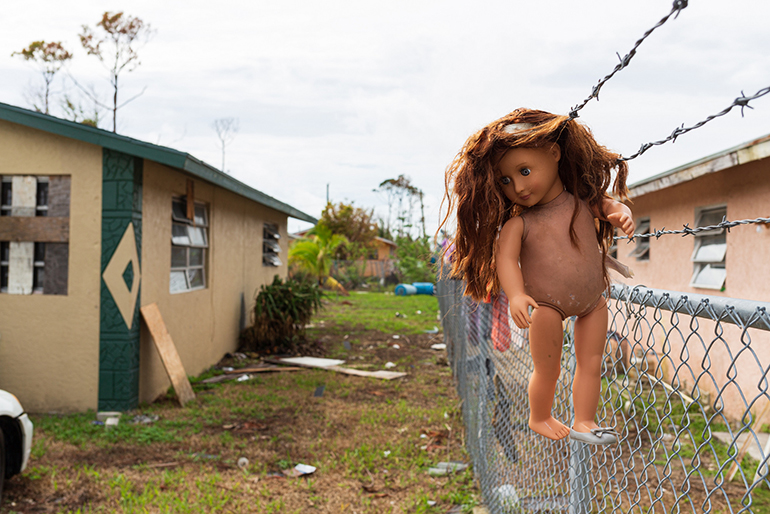
Photographer: TOM TRACY | FC
In the Hudson Estates neighborhood of Freeport, near Mary, Star of the Sea Parish, a doll is seen drying in the sun Oct. 8, more than a month following Hurricane Dorian's impact in The Bahamas. The area was heavily damaged by Dorian's storm surge-flooding throughout Grand Bahama.

